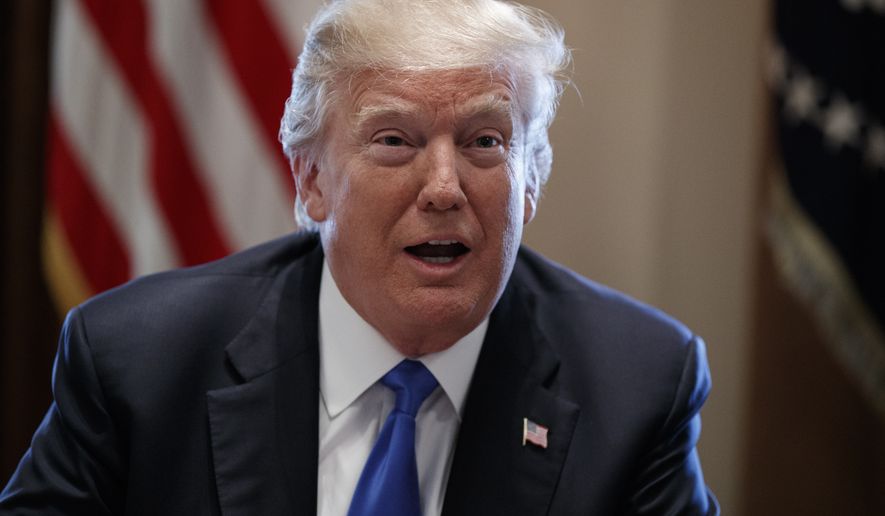President Trump urged Congress on Tuesday to consider returning to the practice of earmarks, saying pork-barrel spending might be the only way to get Republicans and Democrats to cooperate in Washington.
For a president who ran on a vow to “drain the swamp” in Washington, the comments shocked many of his supporters who feared he was opening the door to the “bad old days” of bills loaded with pork, and lawmakers forced to vote for big spending bills in order to get their share.
But Mr. Trump said he’s come to believe that earmarks may be the one way to unify a fractious Congress where the two parties can’t seem to agree on anything.
“I think you should look at a form of earmarks,” the president told lawmakers meeting at the White House on Tuesday. “One thing it did is it brought everybody together.”
Most presidents complain about earmarks, saying the spending siphons decision-making power away from the executive branch — which makes this president’s support for the practice all the more stunning.
He returned to the idea repeatedly during Tuesday’s meeting, saying there need to be controls and limits, but saying he had become convinced that earmarks help grease the wheels of deal making and cooperation, pointing to earlier days when Democrats and Republicans used to pal around much more freely.
SEE ALSO: Paul Ryan confirms GOP talking about earmark revival
“It’s going to bring you together,” he predicted.
His comments came a day after The Washington Times reported that House Republicans are planning hearings later this month to examine restoring earmarks to Congress.
A growing number of lawmakers feel they’ve ceded too much power by giving up the practice.
But conservative lobby groups said the GOP will lose its congressional majorities if it embraces earmarks again.
“Bringing back earmarks is the antithesis of draining the swamp,” said David McIntosh, a former congressman who now runs the conservative Club for Growth. “Earmarks will only benefit the special interests that grow government at the expense of working men and women.”
The National Taxpayers Union said it was “extremely disappointed” in Mr. Trump for endorsing earmarking.
Talking to reporters hours before Mr. Trump spoke, House Speaker Paul D. Ryan wouldn’t say whether he thought earmarks should return, but said he had “encouraged” the renewed attention to them.
“I want our members to have conversations,” he said.
It was Mr. Ryan who in 2016, just after Mr. Trump’s election, headed off the last attempt to revive earmarks.
At the time Mr. Ryan said it would send an anti-Trump signal, going against his “drain the swamp” mandate. Mr. Ryan said that instead of restoring earmarks outright, the House should study the issue early in 2017.
That study didn’t happen, as Congress turned to other pressing business.
But lawmakers told The Washington Times it will happen now, beginning with hearings led by Rules Committee Chairman Pete Sessions.
At its peak, earmarking accounted for about 1 percent of federal spending — though some of the worst practices produced an outsized level of embarrassment.
The Times has reported on one earmark to send $100,000 to a library in South Carolina — $50,000 more than the library wanted. The money was actually sent instead to a town in California that didn’t even have a library.
A wealthy Florida community that asked for $100,000 to build bus shelters ended up getting $250,000. And New York City was granted $200,000 to take an inventory of elderly Irish immigrants, after one man died and went unnoticed for days.
Other earmark projects, such as the notorious “Bridge to Nowhere” in Alaska or Nevada’s cowboy poetry festival, became national laughing stocks.
One Republican congressman, then-Rep. Randy “Duke” Cunningham, a former Navy pilot hailed by colleagues as a war hero, landed in jail after offering to sell earmarks in the defense spending bill in exchange for cash.
Mr. Trump in his remarks Tuesday mentioned “those other problems” and insisted that if lawmakers do restart earmarking, “you’re going to do it honestly.”
Earmark supporters — who say they prefer the term “directed spending” — say the issue has come to a head after some federal agencies have ignored lawmakers’ requests. Several pointed to the Army Corps of Engineers as a particular problem, saying the federal government’s public projects agency regularly refuses to listen to suggestions for priorities.
“We have members who are very frustrated with the Corps,” Mr. Ryan said.
• Stephen Dinan can be reached at sdinan@washingtontimes.com.




Please read our comment policy before commenting.